🔑 Key Findings:
- OCD affects 2% of the global population
- Having OCD increased the risk of death by 82%
- The risk was 3 times higher for unnatural causes, like suicide
STOCKHOLM, Sweden — It’s common for those living with obsessive compulsive disorder (OCD) to insist on arranging their homes and schedules in a very specific way. Any disturbance in their set routine often triggers major anxiety. While studies have linked OCD to a lower quality of life, concerning new research reports that those living with OCD may also have an increased risk of death – from both natural and unnatural causes.
On a somewhat more positive note, researchers add that many of the natural causes of death are preventable. Consequently, they believe that improved surveillance, prevention, and early intervention strategies will help tremendously in terms of lowering the risk of fatal outcomes among OCD patients.
Scientists define obsessive compulsive disorder (OCD) as intrusive thought patterns and fears (obsessions) associated with repetitive behaviors or rituals (compulsions). For example, excessively washing one’s hands or repeatedly checking that the front door is secure. The disorder is by no means rare, either. The typically long-term psychiatric disorder impacts about two percent of the population, both on a global scale and domestically in the United States.
“Non-communicable diseases and external causes of death, including suicides and accidents, were major contributors to the risk of mortality in people with OCD. Better surveillance, prevention, and early intervention strategies should be implemented to reduce the risk of fatal outcomes in people with OCD,” researchers explain in a media release.
While OCD is linked to a number of additional negative life developments, such as academic underachievement, poor work prospects, alcohol and substance use disorders, and even an increased death risk, prior studies focusing on OCD and specific causes of death primarily focused on unnatural causes (suicide, for example). Consequently, far less is known regarding OCD’s link to natural causes of death.

In an attempt to find further answers, study authors conducted this study to estimate the risk of all cause and cause specific death in people with OCD in comparison to matched unaffected individuals from the general population as well as with their unaffected siblings. Data provided by several Swedish population registers made the analysis possible. In all, researchers identified 61,378 people with OCD and 613,780 individuals without OCD matched (1:10) according to sex, birth year, and county of residence. Additionally, study authors included a sibling group consisting of 34,085 people with OCD and 47,874 without OCD.
Participants’ average age at the time of their OCD diagnosis was 27 years-old, and study authors monitored the groups for a median period of eight years at any point between January 1973 and December 2020. All in all, those with OCD showed a higher death rate than matched individuals without OCD; 8.1 per 1,000 person years for OCD participants and 5.1 for non-OCD participants.
Even after adjusting for numerous additional, potentially influential factors like birth year, sex, county, migrant status, education and family income, researchers still found those with OCD displayed an 82-percent increased risk of death from any cause. This excess death risk was higher for both natural (31% increased risk) and, even more so, unnatural causes of death (a three-fold increased risk).
Regarding natural causes of death, people with OCD showed an increased risk due to respiratory system diseases (73%), mental and behavioral disorders (58%), genitourinary system diseases (55%), endocrine, nutritional, and metabolic diseases (47%), diseases of the circulatory system (33%), nervous system (21%), and digestive system (20%). For unnatural causes, suicide showed the highest risk of death (a nearly five-fold increased risk), with accidents ranking second (a 92% increased risk).
For men and women, the risk of all-cause death appears similar, but women living with OCD show a higher relative risk of dying due to unnatural causes than men with OCD. Study authors theorize this is probably due to the lower baseline risk seen among women across the general population. Notably, and conversely, those with OCD also had a 10-percent lower risk of death tied to tumors (neoplasms).
The research team stresses this is an observational study, and thus can’t establish causation. Also, they point to the fact that the registry data only included diagnoses made in specialist care. Finally, it’s unclear if these conclusions are applicable to other settings with their own unique populations, health systems, and medical practices.
In conclusion, study authors still assert this project was a large study conducted with high quality national data – and its findings remained largely consistent even after researchers performed further adjustments for psychiatric conditions and family factors.
The study is published in The BMJ.

> genitourinary system diseases (55%)
What does this mean? Can you give an example?